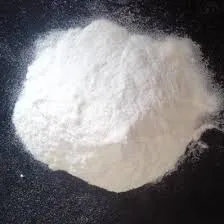
జన . 02, 2025 18:55 Back to list
hpmc solubility in water
Solubility of HPMC in Water An In-Depth Analysis
Hydroxypropyl methylcellulose (HPMC) is a semi-synthetic polymer derived from cellulose, widely recognized for its versatile applications in various fields, including pharmaceuticals, food, and cosmetics. One of the most critical properties of HPMC is its solubility in water, which significantly influences its functionality and performance in numerous formulations.
Understanding HPMC Solubility
HPMC is a non-ionic polymer, characterized by the presence of hydroxypropyl and methoxy groups. This unique structure imparts hydrophilic properties to the polymer, allowing it to interact favorably with water molecules. The solubility of HPMC in water is affected by several factors, including its molecular weight, the degree of substitution, and the temperature of the aqueous environment.
Typically, HPMC is available in various grades, each with different molecular weights and substitution levels. Higher molecular weight HPMCs tend to have lower solubility compared to their lower molecular weight counterparts. This is primarily because larger molecules require more energy to disperse in water, making their dissolution process slower. Conversely, low molecular weight HPMC can dissolve rapidly, leading to more effective thickening and binding properties in formulations.
Factors Affecting Solubility
1. Degree of Substitution (DS) The degree of substitution refers to the average number of hydroxyl groups substituted by hydroxypropyl or methoxy groups on the cellulose backbone. A higher degree of substitution results in increased hydrophilicity, enhancing water solubility. HPMCs with a DS greater than 1.0 generally exhibit good solubility in water.
2. Temperature The solubility of HPMC in water is also influenced by temperature. As the temperature increases, the kinetic energy of water molecules rises, which can facilitate the dissolution of solids. Therefore, warm or hot water is often used to dissolve HPMC more efficiently in various applications.
hpmc solubility in water

3. pH Levels Although HPMC is non-ionic and relatively neutral, extreme pH levels can impact its solubility. Acidic or basic conditions may lead to changes in the polymer's configuration, affecting its ability to interact with water.
4. Presence of Salts or Other Solutes The solubility of HPMC can be affected by the presence of salts or other solutes in the solution. Certain ions can compete with HPMC for interaction with water, potentially reducing its solubility.
Applications of HPMC Based on Its Solubility
The solubility of HPMC dictates its application in various industries. In the pharmaceutical sector, for example, HPMC is often used as a binder and film-forming agent in tablets. Its ability to dissolve in an aqueous environment ensures that medications are released effectively within the body.
In the food industry, HPMC is utilized as a thickener and emulsifier. Its solubility in water allows it to create stable emulsions and suspensions, enhancing the texture and mouthfeel of food products. Additionally, HPMC does not impart any significant flavor, making it an ideal choice for food applications.
In the cosmetics industry, HPMC serves as a viscosity modifier and stabilizer. Its solubility in water is crucial for formulating creams, lotions, and gels, ensuring that the products maintain their desired consistency and performance over time.
Conclusion
In summary, the solubility of Hydroxypropyl methylcellulose in water is a crucial property that determines its practicality and performance across various applications. Factors such as molecular weight, degree of substitution, temperature, pH levels, and the presence of other solutes play significant roles in this solubility. Understanding these factors allows manufacturers and formulators to exploit HPMC’s functionalities effectively, ensuring optimal performance in pharmaceuticals, food, and cosmetic products. As research continues to evolve, the potential applications for HPMC will expand, further enhancing its importance in diverse fields.
-
Versatile Hpmc Uses in Different Industries
NewsJun.19,2025
-
Redispersible Powder's Role in Enhancing Durability of Construction Products
NewsJun.19,2025
-
Hydroxyethyl Cellulose Applications Driving Green Industrial Processes
NewsJun.19,2025
-
Exploring Different Redispersible Polymer Powder
NewsJun.19,2025
-
Choosing the Right Mortar Bonding Agent
NewsJun.19,2025
-
Applications and Significance of China Hpmc in Modern Industries
NewsJun.19,2025







